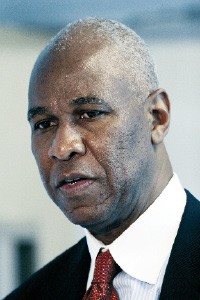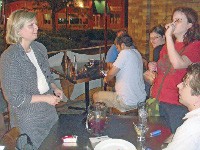Forums are all the rage these days as Labor Day approaches — after which the crowded 2007 pre-election calendar starts to overflow big-time.
Among the events to watch are two forthcoming candidate debates co-sponsored by the Flyer and the Memphis Rotary Club. On September 4th, candidates for the hotly contested District 9, Position 2 seat will square off, and one week later the major mayoral candidates will have at it. Both events are at noon at the Cook Convention Center.
Having thus done my duty by our own events, I must next tip the hat to the Coalition for a Better Memphis, which actually succeeded in getting all four major mayoral hopefuls — including the debate-leery Mayor Willie Herenton — on the same stage, though only one after the other, answering the same series of across-the-board questions.
The event last Thursday, at the Bridge Builders site downtown, wasn’t therefore a debate — as moderators Roby Williams and Bobbi Gillis stressed — but it may have been the next best thing.
Standing in front of a climbing wall in a cavernous, well-filled room, the four hopefuls appeared in sequence before the same audience and answered the same questions from Williams and Gillis, while members of the coalition set about grading the answers according to a four-level scale.
Based on what the candidates said, how they said it, and what others said about it later on, these are some broad conclusions:
John Willingham, who was first up, clearly meant to demonstrate that he was no crank but a serious man with serious proposals. The former Shelby County commissioner was a beneficiary, as he always is from time-restrictive formats, of the two-minute-per-answer limits on the nine questions asked.
Kept thereby from waxing prolix, Willingham was still able to offer a host of specific proposals. Some of them, e.g., drastically curtailing a mayor’s contractual authority and the number of his patronage positions, seemed good fits for the current debate on charter changes. Others, like his concept of turning the Fairgrounds into an Olympic training village that could generate 2,000 jobs and $2 billion in annual revenues, were of the sort that Willingham fans would consider visionary and non-fans might regard as fanciful.
Even under the time and format constraints, Willingham put forth too many proposals and statistics to be easily summarized. All that was consistent with the suggestion that the mayor’s job was to be both an executive and an idea man. Conversation among attendees afterward indicated that those who tend to see him as a crank will continue to do so; those who regard him as farsighted and misunderstood, likewise. A point of general agreement concerned his limited base and the small likelihood of his being elected.
Herman Morris was the second candidate to appear. He spoke briskly and without hesitation, letting general statements substitute for extended elaboration.
Contrasting his up-from-poverty background with his quality education (Rhodes College, Vanderbilt law school), Morris characterized himself as an able executive with a proven track record, especially at MLGW, which he headed for seven years. He also noted such involvements as his former chairmanship of the Greater Memphis Chamber of Commerce, experience on industry-seeking missions, and 20 years’ membership on a state lawyers’ ethics panel, two years as chairman.
In answer to a question about achieving diversity in government, Morris, an African American who emphasizes his potential appeal to both races, gave an answer that might resonate better with whites than with blacks.
The standard for city employment, he said, should be “not just diversity, but … merit, experience, talent, skills, history, track record of success,” as it was at MLGW under his administration, he said. That was a head-scratcher, unless, as a Republican well-wisher opined, it was one means of distancing himself from recent publicity regarding his well-received remarks at gay/lesbian forums.
Verdict: Morris, markedly less stiff than when he first announced, held his place in line. He’s viable if he can somehow generate better across-the-board traction than he’s managed so far. Among other things, he repeated his challenge for other candidates to follow his lead in taking a drug test. For all the trying, that one has not yet so much as blipped on the public radar screen.
He may have a way to go before convincing a majority that he is something “new and different and better.”
Willie Herenton was the third candidate to appear. Unsurprisingly, the mayor wanted to talk specifics — or at least those stats and achievements that suggested his first four terms had been a success.
Herenton eschewed the “hating on me” rhetoric of an earlier speech to the Whitehaven Kiwanis Club. Appearing stately and dignified, he warned against “novices,” boasted of his “40 years in public service,” recapped his career as a school principal, school superintendent, and mayor, and repeated his series of rhetorical challenges to the Chamber of Commerce concerning which mayor had presided over the city’s best economic growth, per capital income, etc. “Of course, I already know the answer to that,” he said.
Herenton declared, “We have virtually eliminated decayed public housing as we have known it in the past.” He also boasted a blameless personal record on ethics matters and claimed to have achieved the most diverse city workforce in Memphis history. Other professed achievements were more familiar — like downtown redevelopment in general and, in particular, the FedExForum and the NBA franchise that came with it.
So far, so good, except that such accomplishments are no longer regarded as unalloyed benefits and are the subject these days of a critical second sight.
All in all, the mayor may not have provided a fresh prospectus or a convincing rebuttal to his opponents’ insistence that it’s “time for a change.”
Carol Chumney was the final speaker, and her reception was every bit as revealing as anything explicit she said at the event. Council member Chumney’s persona as a persistent scold of the administration and of government and politics as usual continues to serve as both medium and message.
Unlike the other candidates, the former state legislator made few concrete proposals, couching her statements almost solely in terms of the shortcomings she perceives in the current city administration or in terms of general goals. Her very first sentence said it: “I’m running to bring about safe streets, safe schools, and safe neighborhoods and to clean this city up once and for all.”
Though her Web site contains specific proposals, Chumney on the stump rarely deals in such specific terms. Her remedies at the forum were more broadly stated: e.g., “more accountability … a mayor more capable of inspiring the city … stronger on children and youth … neighborhood watch programs … stronger code enforcement … partnerships with all kinds of people,” and so forth.
As during the nearly four years of her service on the council, Chumney proved most compelling when she presented herself as the avenger, as the dedicated scourge of everything that is wrong with city government. “You know, we have a lot of moonlighting going on at City Hall. People don’t talk about that,” she said at one point. And ears perked up.
Overall, to judge by word-of-mouth afterward, Willingham’s presentation was discounted more than it might have been if his prospects were deemed brighter; Morris held his own; Herenton came off well (if somewhat out of answers on the freshness front); and Chumney, questions about her financial wherewithal notwithstanding, is still getting the benefit of the doubt.
• Among the several other groups sponsoring candidate forums are Mid-South Democrats in Action (MSDIA) and One Hundred Black Men, who collaborated in an event last week at the University of Memphis Law School featuring candidates for the three council positions in Super-District 8.
Turnout by the candidates was good — as, in the opinion of most observers, was the content of candidate responses. The major absentees for the forum were Position 1 incumbent Joe Brown and Position 2 challenger Janis Fullilove (who was apparently conducting a simultaneous campaign event).
• Two District 9 races are attracting much attention. That for Position 2 is widely regarded as a showdown between lawyer/broadcast executive Shea Flinn and businessman Kemp Conrad — a Democrat and a Republican, respectively, though both have support across partisan lines. Newcomer Frank Langston also has good support. “Memphis Watchdog” blogger Joe Saino will have an impact, as may Joseph Baier.
Contenders for Position 3 include another well-connected newcomer, Reid Hedgepeth, businessman Lester Lit, lawyer/activist Desi Franklin, neighborhood activist and former interim legislator Mary Wilder, and Democratic activist Boris Combest. The first three named have most of the sign action so far.
A detailed version of these items is available in “Political Beat” at www.memphisflyer.com.
 Justin Fox Burks
Justin Fox Burks  Jackson Baker
Jackson Baker  Jackson Baker
Jackson Baker